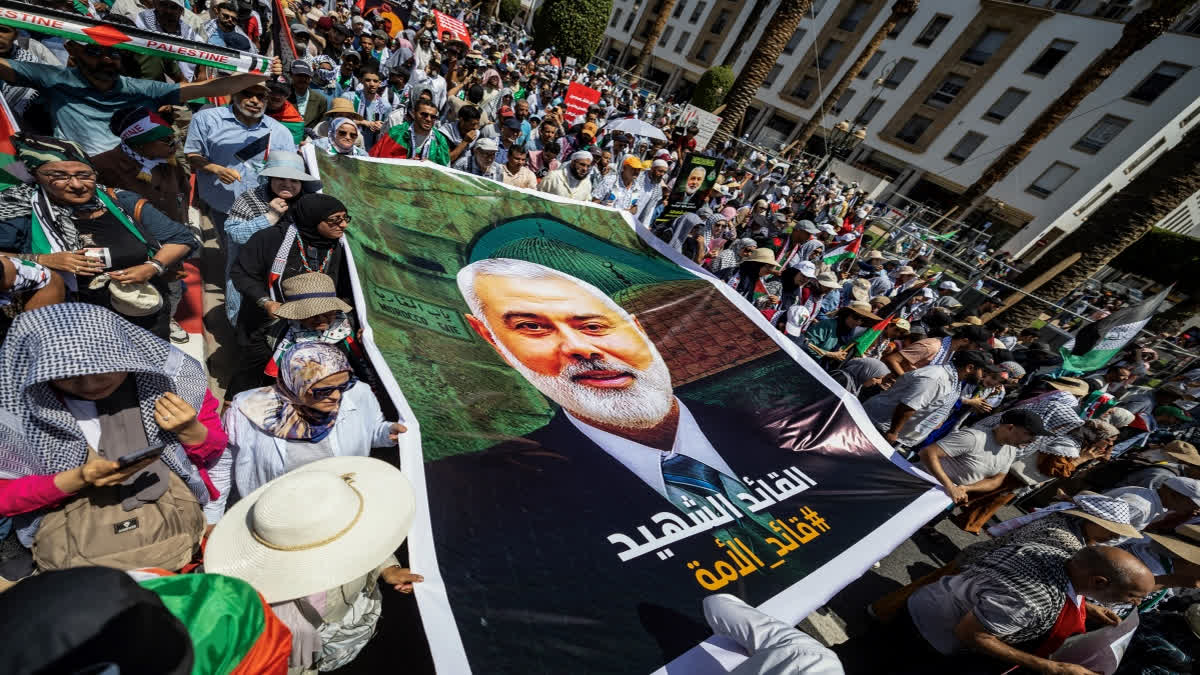Gaza City: The Palestinian armed group Hamas on October 7 last year launched a surprise attack on Israel in one of the most serious escalations in the Israel-Palestinian conflict in years. The savage attack marked the beginning of a new chapter in the decades-long grapple between Palestine and Israel.
Though the surprise attack demonstrated the capabilities of Hamas to leave Israel caught off guard, inflicting heavy casualties and abducting its nationals, it also opened an enormous military response from Israel that has severely weakened the group in the past year.
The Hamas movement was founded in Gaza in 1987 by an imam, Sheikh Ahmed Yasin, and his aide Abdul Aziz al-Rantissi shortly after the start of the first Intifada, an uprising against Israel’s occupation of the Palestinian territories.
The movement started as an offshoot of the Muslim Brotherhood in Egypt and created a military wing, the Izz al-Din al-Qassam Brigades, to pursue an armed struggle against Israel "to liberate historic Palestine". The group politically controls the Gaza Strip, a territory of about 365sq km (141sq miles) that is home to more than two million people but is blockaded by Israel.
Hamas has been in power in the Gaza Strip since 2007 after a brief war against Fatah forces loyal to President Mahmoud Abbas, the head of the Palestinian Authority and Palestine Liberation Organization (PLO).
According to the organisation, it carried out its military operation on October 7 in response to atrocities that Palestinians have faced over decades. The attack resulted in the deaths of 1,205 people, most of them civilians according to a tally based on official Israeli figures.
The retaliatory campaign by Israel in Gaza has so far incurred a great cost on Hamas in terms of the leadership, fighters, and infrastructure. Several of its high-ranking leaders have been assassinated or targeted for killing, including Ismail Haniyeh, who was assassinated in Iran in July 2024. The reports claim thousands of Hamas militants are dead due to the Israeli offensive, but the figures are not well known. Israeli officials claim more than 17,000 Palestinian fighters were killed, while Hamas approves several thousand fighters have died.
The human cost has been high, but Hamas has put up a fight. Days after Haniyeh's passing, the group nominated Yahya Sinwar as its new leader. Israel contends that Sinwar coordinated the October 7 attack. According to reports, he commands the control of both the armed and political wings of Hamas. The whereabouts of many of its top leadership are still unclear. There are conflicting claims about Mohammed Deif, the Gaza Strip's Hamas military chief, claiming that he is either still alive or killed.
Gaza's civil infrastructure and institutions, most of which Israel said Hamas used for military objectives, have been heavily destroyed in the war. Schools, hospitals, universities, and power and water plants were damaged or destroyed. Ruin on such a large scale paralysed Gaza's economy, which UN estimates indicate shrank to one-sixth of its pre-war capabilities.
Hamas officials insist that they still enjoy wide support, maintaining their views based on polls indicating many Palestinians hold that belief, especially in the West Bank, that Hamas will eventually win against Israel.
Analysts say that Hamas, however, has suffered "a grievous but not crushing blow." The power tussle is still even, and neither the Israelis nor the Palestinians can claim an unequivocal victory in more than a year of raging battle.
With the whole region in the fear of an all-out war, the future of Hamas and its control over Gaza remains uncertain as the conflict unfolds. Most likely, the group's long-term prospects in the region will depend on its ability to persist despite sustained military pressure and overwhelming civilian hardship.



